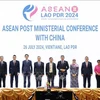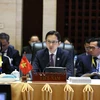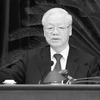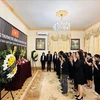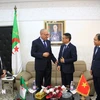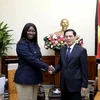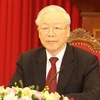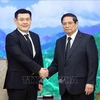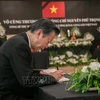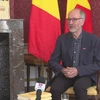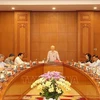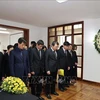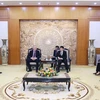Leaders of ASEAN member states issued the Phnom Penh declaration, approving the Human Rights Declaration (AHRD) at the end of their 21 st Summit in Phnom Penh, Cambodia, on November 18.
AHRD is the first ever important political document on human rights cooperation in the region.
They also adopted an action plan to implement the Bali Declaration on the “ASEAN Community in a Global Community of Nations” and officially launch the ASEAN Institute for Peace and Reconciliation (AIPR).
At the closed-door session, Vietnamese Prime Minister Nguyen Tan Dung said ASEAN is dealing with complicated challenges, both traditional and non-traditional, from latent conflicts to cross border problems, such as environmental protection, water resource security and natural disaster prevention and control.
Holding on the spirit of unity and mutual assistance, ASEAN needs to positively consider, exchange and work together to build a common viewpoint on some important regional issues, Dung said.
On the East Sea issue, he affirmed the importance of peace, stability and maritime security in the sea area.
The Vietnamese leader also laid stress on the peaceful resolution of disputes, and the observance of international law and the 1982 UN Convention on the Law of the Sea, including the full implementation of the Declaration on the Conducts of Parties (DOC) in the East Sea, the ASEAN Six-point Principle on the East Sea and the early building of the Code of Conducts of Parties in the East Sea.
When reviewing the implementation of a roadmap to build the ASEAN community, PM Dung and other ASEAN leaders agreed to continue to mainstream regional cooperation plans into national programmes and strengthen the collaboration among competence agencies to ensure the synchronous and effective implementation at regional and national levels.
To the challenges facing the region, they emphasised the need to remain united and uphold the group’s central role when working on orientations to guide regional cooperation and evolvement architecture, and deal with the issues relating to the region’s common strategic interests, like peace, security and cooperation development.
The leaders agreed to encourage the enhancement of cooperation between the group and its partners in addressing on non-traditional security issues and coping with emerging challenges, such as climate change, natural disasters, water resource security, maritime safety security, terrorism and transnational crime.
Regarding the region’s external relations, they reached a consensus that the group needs to further expand cooperation with its partners while bringing to full play its key role in promoting regional cooperation frameworks and progress, such as ASEAN Plus 1, ASEAN Plus 3, the East Asia Summit (EAS), the ASEAN Regional Forum (ARF), and the ASEAN Defence Ministers’ Meeting Plus (ADMM+).
On this occasion, ASEAN leaders officially launched the start of negotiations on the Regional Comprehensive Economic Partnership (RCEP).
They affirmed continued support for the Myanmar governments’ national reconciliation and the peaceful and non-nuclear Korean peninsula.
In terms of the Gaza Strip, the ASEAN countries called upon concerned parties to take actions to bring the violence to and end.
ASEAN Plus 1 Summits between ASEAN its partners, namely China, Japan, the Republic of Korea, India and the US, the ASEAN Plus 3 Summit and the EAS will be held between November 19-20.-VNA
AHRD is the first ever important political document on human rights cooperation in the region.
They also adopted an action plan to implement the Bali Declaration on the “ASEAN Community in a Global Community of Nations” and officially launch the ASEAN Institute for Peace and Reconciliation (AIPR).
At the closed-door session, Vietnamese Prime Minister Nguyen Tan Dung said ASEAN is dealing with complicated challenges, both traditional and non-traditional, from latent conflicts to cross border problems, such as environmental protection, water resource security and natural disaster prevention and control.
Holding on the spirit of unity and mutual assistance, ASEAN needs to positively consider, exchange and work together to build a common viewpoint on some important regional issues, Dung said.
On the East Sea issue, he affirmed the importance of peace, stability and maritime security in the sea area.
The Vietnamese leader also laid stress on the peaceful resolution of disputes, and the observance of international law and the 1982 UN Convention on the Law of the Sea, including the full implementation of the Declaration on the Conducts of Parties (DOC) in the East Sea, the ASEAN Six-point Principle on the East Sea and the early building of the Code of Conducts of Parties in the East Sea.
When reviewing the implementation of a roadmap to build the ASEAN community, PM Dung and other ASEAN leaders agreed to continue to mainstream regional cooperation plans into national programmes and strengthen the collaboration among competence agencies to ensure the synchronous and effective implementation at regional and national levels.
To the challenges facing the region, they emphasised the need to remain united and uphold the group’s central role when working on orientations to guide regional cooperation and evolvement architecture, and deal with the issues relating to the region’s common strategic interests, like peace, security and cooperation development.
The leaders agreed to encourage the enhancement of cooperation between the group and its partners in addressing on non-traditional security issues and coping with emerging challenges, such as climate change, natural disasters, water resource security, maritime safety security, terrorism and transnational crime.
Regarding the region’s external relations, they reached a consensus that the group needs to further expand cooperation with its partners while bringing to full play its key role in promoting regional cooperation frameworks and progress, such as ASEAN Plus 1, ASEAN Plus 3, the East Asia Summit (EAS), the ASEAN Regional Forum (ARF), and the ASEAN Defence Ministers’ Meeting Plus (ADMM+).
On this occasion, ASEAN leaders officially launched the start of negotiations on the Regional Comprehensive Economic Partnership (RCEP).
They affirmed continued support for the Myanmar governments’ national reconciliation and the peaceful and non-nuclear Korean peninsula.
In terms of the Gaza Strip, the ASEAN countries called upon concerned parties to take actions to bring the violence to and end.
ASEAN Plus 1 Summits between ASEAN its partners, namely China, Japan, the Republic of Korea, India and the US, the ASEAN Plus 3 Summit and the EAS will be held between November 19-20.-VNA
